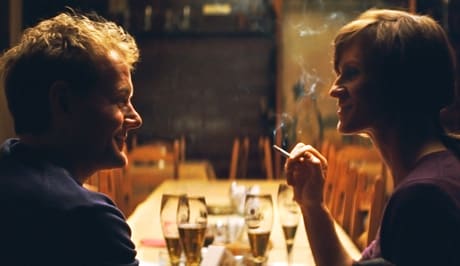If nothing else, Tom Tykwer's latest, hyper-realized testament to rule breaking abandon proves that even at his worst, he's still a better filmmaker than most other directors on their best day.
While Three demonstrates bravery in its willingness to thumb its nose at biological determinism, suggesting that sexual orientation is merely a confining mode of identity construct to prove existence, it still feels like a slightly less affecting, but more comedic and focused, version of Tykwer's first film, Winter Sleepers.
Opening with an extended interpretive dance, intended to summarize the plot in a broad sense, this protracted game of chance and fatalism finds married couple Hanna (Sophie Rois) and Adam (Devid Striesow) struggling to connect sexually, bickering and submitting to the quotidian after years of the same. Of course, this is presented in as complex a stylization as possible, with multiple screen divisions, excess edits and spinning camera work adding a sense of tension to the generic while a light techno soundtrack hums in the background.
While the titular third, Simon (Sebastian Schipper), acts as a catalyst for change when he enters Hanna's life, discussing the ethics of scientific research, when not banging her senseless, Adam's story primes him for a more significant lifestyle upheaval by giving him testicular cancer — the surgery for which is graphically shown — and the pain of losing a parent. This seemingly opens him up to a little post-swim locker room jerk off session with Simon — a stranger to Adam — unbeknownst to all involved.
The question of choice versus fate and happenstance looms on the periphery for the duration, acting as a logical argument for chilling out about life while the characters run around, panicking about the surmounting rules and expectations to which they've shackled themselves.
Cinematically contentious camera work and the oft-tendency to derail traditional narratives by shifting means of storytelling invigorate these didactics. But, ultimately, the notion that the traditional heteronormative routine is little more than a cage for breeders to roam around in isn't particularly profound.
(X-Filme)While Three demonstrates bravery in its willingness to thumb its nose at biological determinism, suggesting that sexual orientation is merely a confining mode of identity construct to prove existence, it still feels like a slightly less affecting, but more comedic and focused, version of Tykwer's first film, Winter Sleepers.
Opening with an extended interpretive dance, intended to summarize the plot in a broad sense, this protracted game of chance and fatalism finds married couple Hanna (Sophie Rois) and Adam (Devid Striesow) struggling to connect sexually, bickering and submitting to the quotidian after years of the same. Of course, this is presented in as complex a stylization as possible, with multiple screen divisions, excess edits and spinning camera work adding a sense of tension to the generic while a light techno soundtrack hums in the background.
While the titular third, Simon (Sebastian Schipper), acts as a catalyst for change when he enters Hanna's life, discussing the ethics of scientific research, when not banging her senseless, Adam's story primes him for a more significant lifestyle upheaval by giving him testicular cancer — the surgery for which is graphically shown — and the pain of losing a parent. This seemingly opens him up to a little post-swim locker room jerk off session with Simon — a stranger to Adam — unbeknownst to all involved.
The question of choice versus fate and happenstance looms on the periphery for the duration, acting as a logical argument for chilling out about life while the characters run around, panicking about the surmounting rules and expectations to which they've shackled themselves.
Cinematically contentious camera work and the oft-tendency to derail traditional narratives by shifting means of storytelling invigorate these didactics. But, ultimately, the notion that the traditional heteronormative routine is little more than a cage for breeders to roam around in isn't particularly profound.
